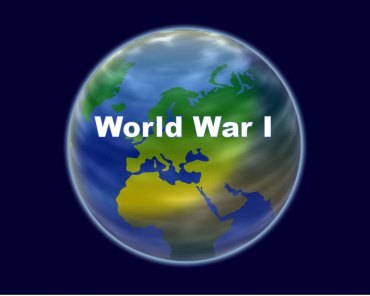
After Austria-Hungary’s July 28, 1914, declaration of war on Serbia dragged Russia, Germany, France, Britain and others into the fight, early names emphasized the war’s European origins. An example is The Kaiser’s War, after Germany’s emperor, Kaiser Wilhelm II.
American newspapers initially referred to the conflict as simply “the war” or “the European War,” according to the Library of Congress. But even before the fighting began, many feared that a fierce war among major European powers would soon ignite a wildfire that could not be contained.
Informal uses of the “great war”—not capitalized or regarded as an official name—appeared on Jan. 9, 1913, in Iowa’s Waterloo Times-Tribune (“Europe's desire to avoid a great war”) and in the Syracuse Herald of New York on Aug. 1, 1914 (“the opening of the great war may be signalized by the most terrific naval battle of modern history”), according to the Oxford English Dictionary, or OED, renowned for its research into the history of words.
A headline in the Pittsburgh Press announced on Aug. 2, 1914, “England has Thrown Lot with France in World War," notes the Online Etymology Dictionary.
The phrases “world war” and “great war” were not new. They had been uttered long before the 1914-18 carnage.
The first recorded appearance of “world war,” according to the OED, was in 1848, when a Scottish newspaper, People’s Journal, presented these words: “A war amongst the great powers is now necessarily a world-war.”
The first reference to “great war” found by the OED was in a book about English history after the Napoleonic Wars of 1803-1815. “A History of England From the Conclusion of the Great War in 1815,” written in six volumes between 1878 and 1886 by Spencer Walpole (1839-1907), includes these words: “At the conclusion of the great war, then, England and Wales had a population of….”
After war broke out in 1914, “great war” and “world war” became more than descriptive phrases. They battled for naming rights to a conflagration unlike any that had been seen before.
The first appearance of “Great War” as a designated name for the war came in a Canadian magazine, Maclean’s, according to the OED.
In an online article published Aug. 2, 2014, Maclean’s writer Patricia Treble described the Great War’s debut in the magazine’s October 1914 issue: “It was in a small note near the bottom of page 53. Under a headline, ‘The Great War,’ it listed previous wars that had named themselves—including the Crimean War, the Thirty Years War and the Civil War.” The October 1914 item then stated: “This is the Great War. It names itself.”
The earliest known use of “first world war” appeared Sept. 20, 1914, in The Indianapolis Star on Page 37,according The Yale Book of Quotations (Yale University Press, 2006).
In the Star piece,“Noted German Scholar Places Blame of Starting War on Great Britain,” Ernst Haeckel (1834-1919), a zoologist and professor who expounded upon Charles Darwin’s studies, stated: “There is no doubt that the course and character of the feared ‘European war’… will become the first world war in the full sense of the word.”
Haeckel’s phrase, still more of a description than a name, earned capital letters in a book by Charles à Court Repington (1858-1925), a war correspondent for English newspapers. The First World War (Houghton Mifflin Co., 1920 ) includes a diary entry from Sept. 10, 1918, two months before the Nov. 11 armistice that ended the war. The entry reads:
“I saw Major Johnstone, the Harvard Professor who is here to lay the bases of an American History. We discussed the right name of the war. I said that we called it now The War, but this could not last. The Napoleonic War was The Great War. To call it The German War was too much flattery for the Boche [derogatory French term for German soldiers]. I suggested The World War as a shade better title, and finally we mutually agreed to call it The First World War in order to prevent the millennium folk from forgetting that the history of the world was the history of war.”
On Feb. 10, 1919,The Manchester Guardian in England was already predicting that “World War No. 2” would erupt from the social upheaval of the 1914-18 war, according to the OED.
After Adolf Hitler’s Germany began annexing lands of neighboring countries, Time magazine introduced its readership to the phrases World War I and World War II, likely the first use of Roman numerals with those wars, the OED says. In a June 12, 1939, article, “Europe: War Machines,” Time recapped the military might of nations “in World War I,” and discussed what might happen “in World War II.”
On Sept. 11, 1939, Time led a story called “World War: Grey Friday” with these words: “World War II began last week at 5:20 a.m. (Polish time) Friday, September 1, when a German bombing plane dropped a projectile on Puck, a fishing village and air base in the armpit of the Hel Peninsula.”
The names created by Time, “World War I” and “World War II,” would be the ones that stuck.
Recommended:
100 Words that Define the First World War: 1914-1918, Oxford English Dictinary
“World war,” Online Etymology Dictionary
“Maclean’s named the Great War,” Maclean’s magazine, Aug. 2, 2014
“World War: Grey Friday,” Time magazine, Sept. 11, 1939
Photos of the Great War --World War I Image Archive
Related:
World War I, Day One: July 28, 1914
100 years ago: 5 reasons World War 1 started
5 classic movies set during World War I
Docudramas: Lost in the fog of war